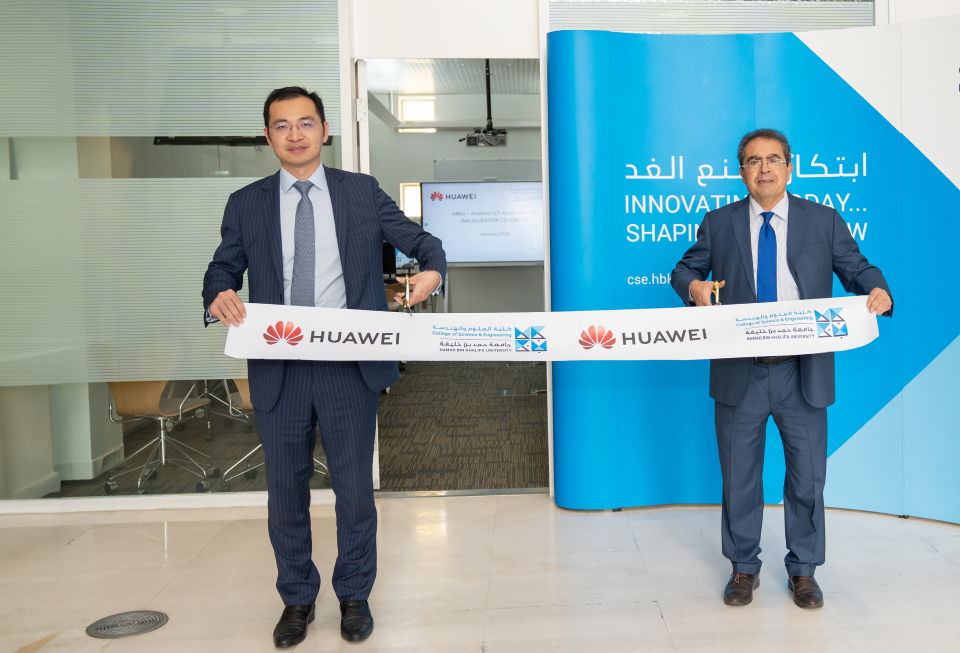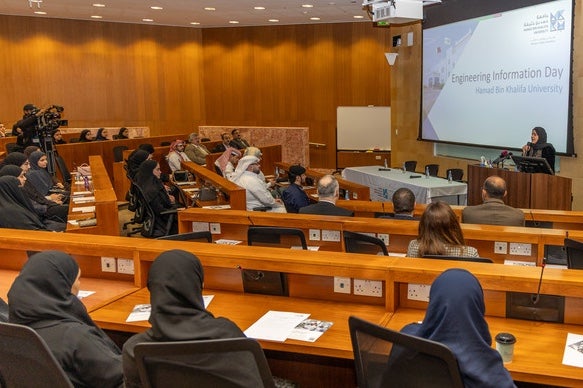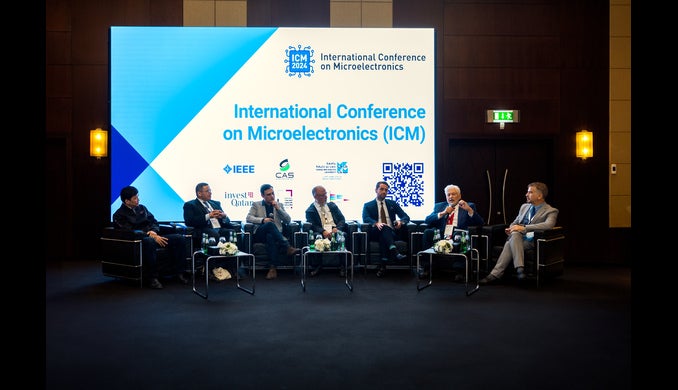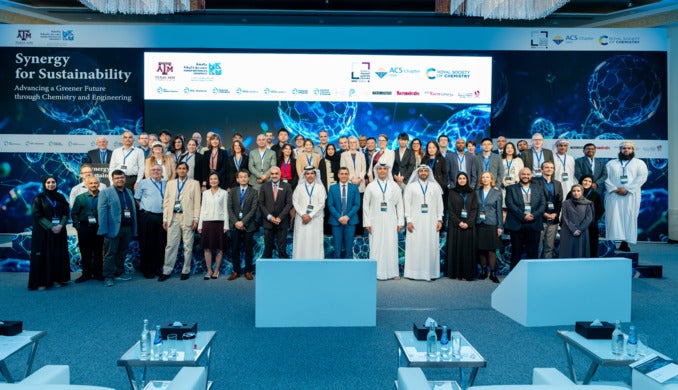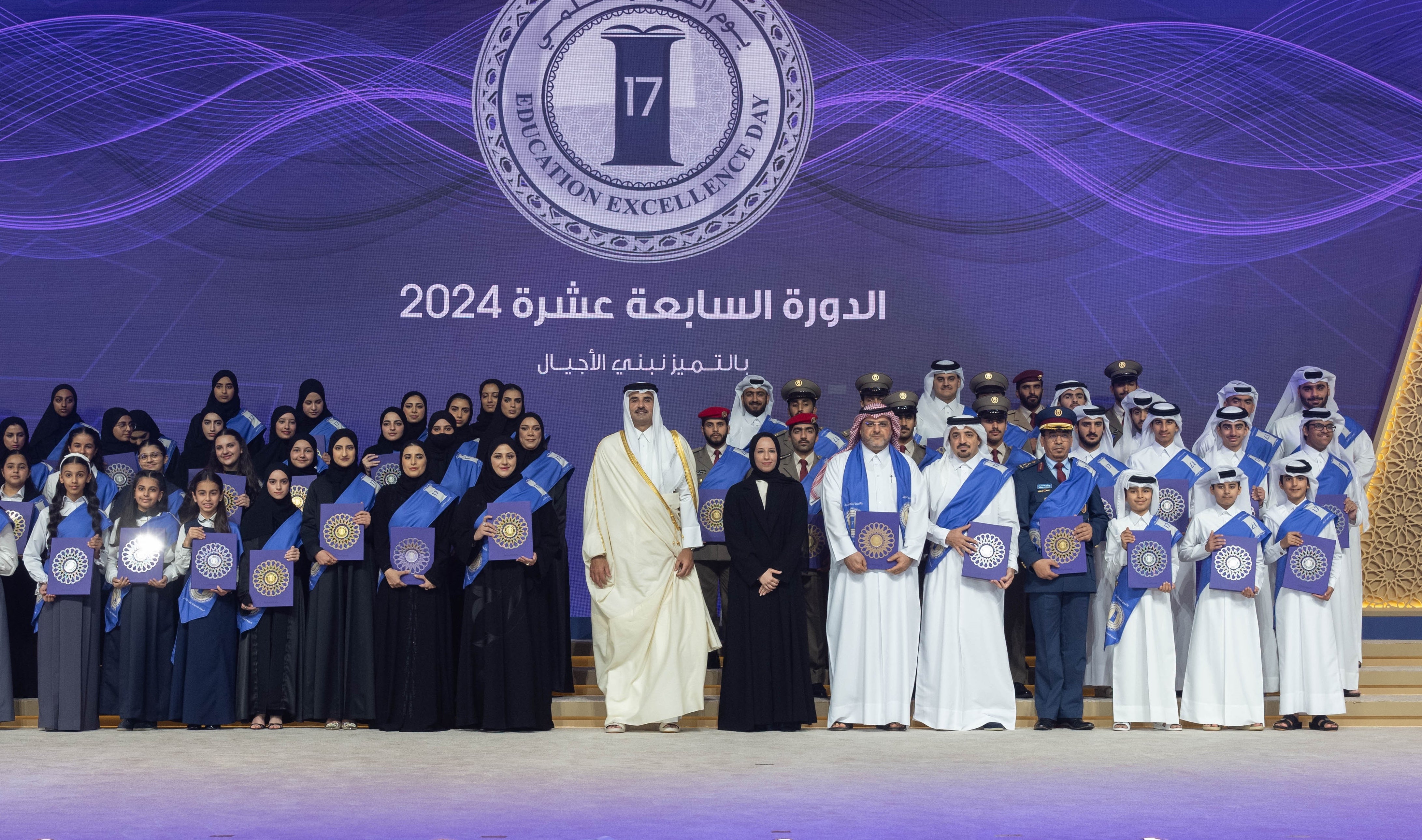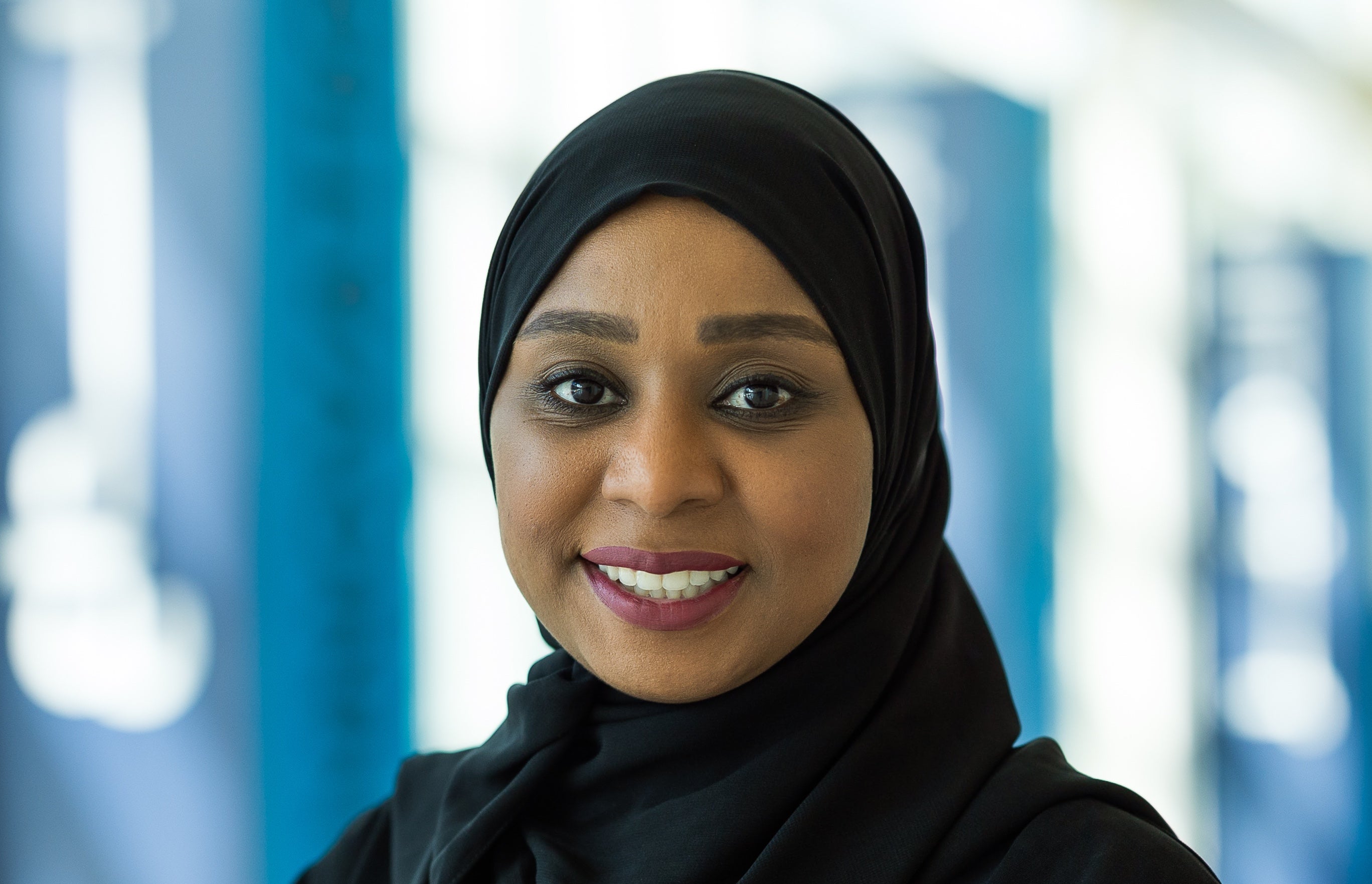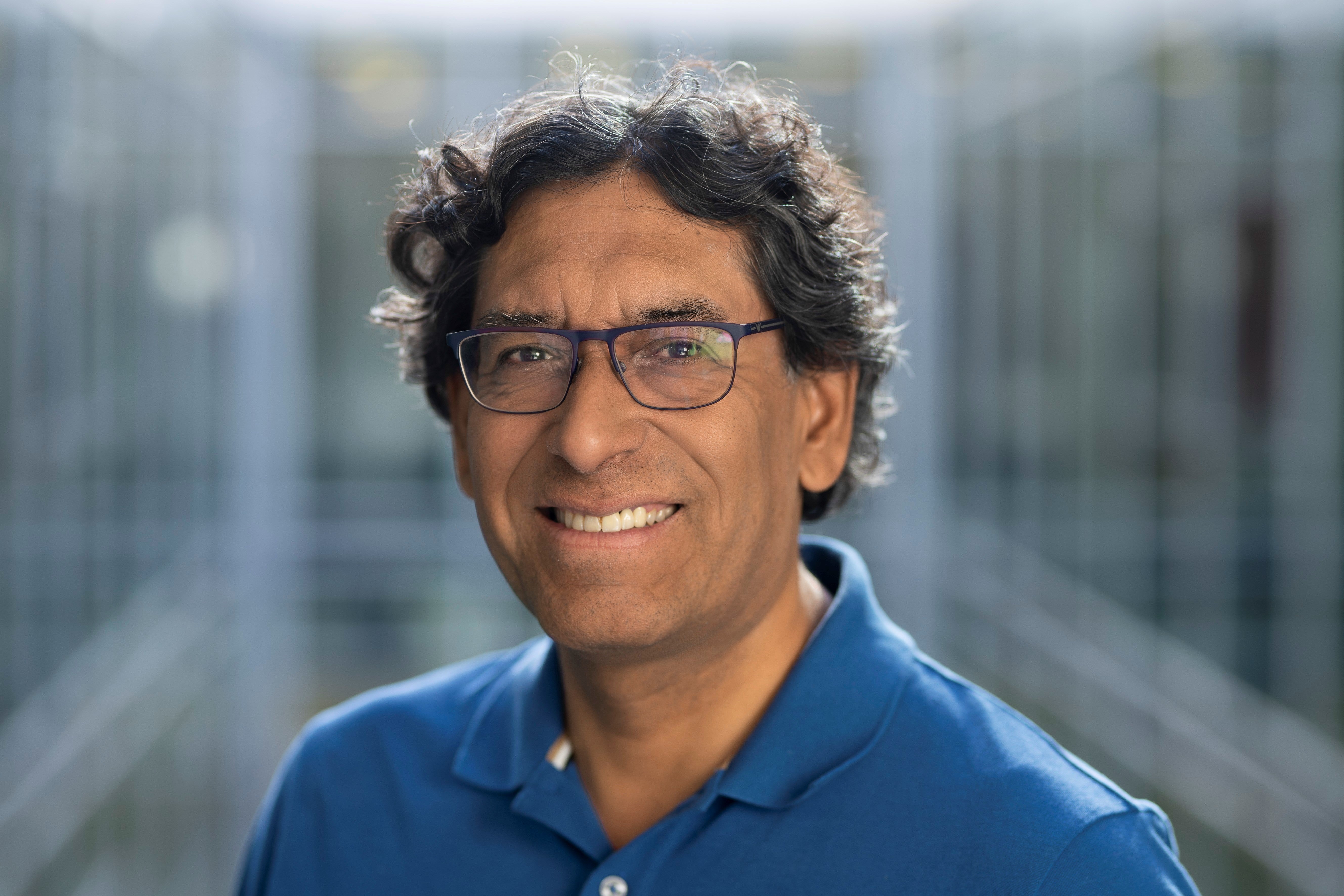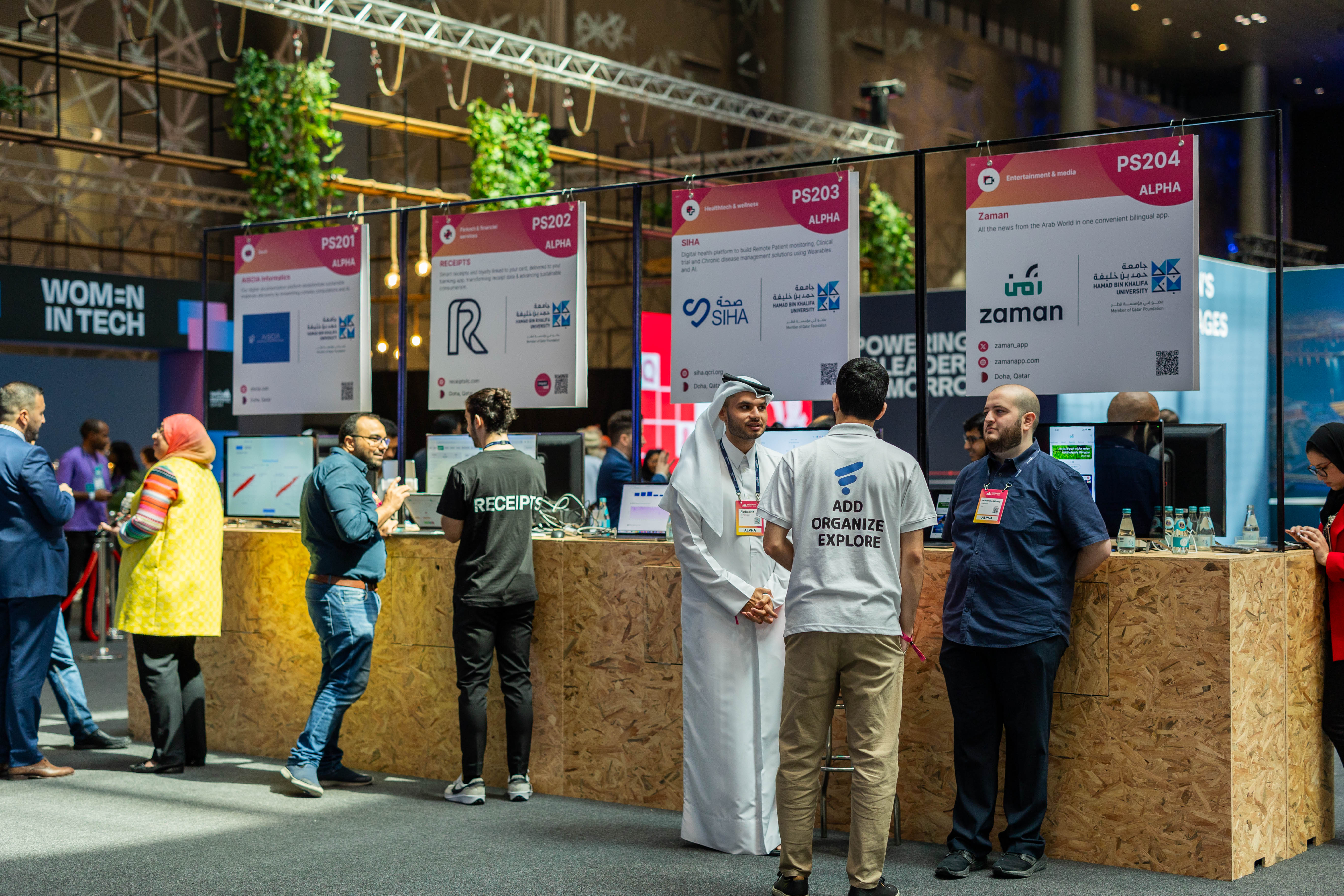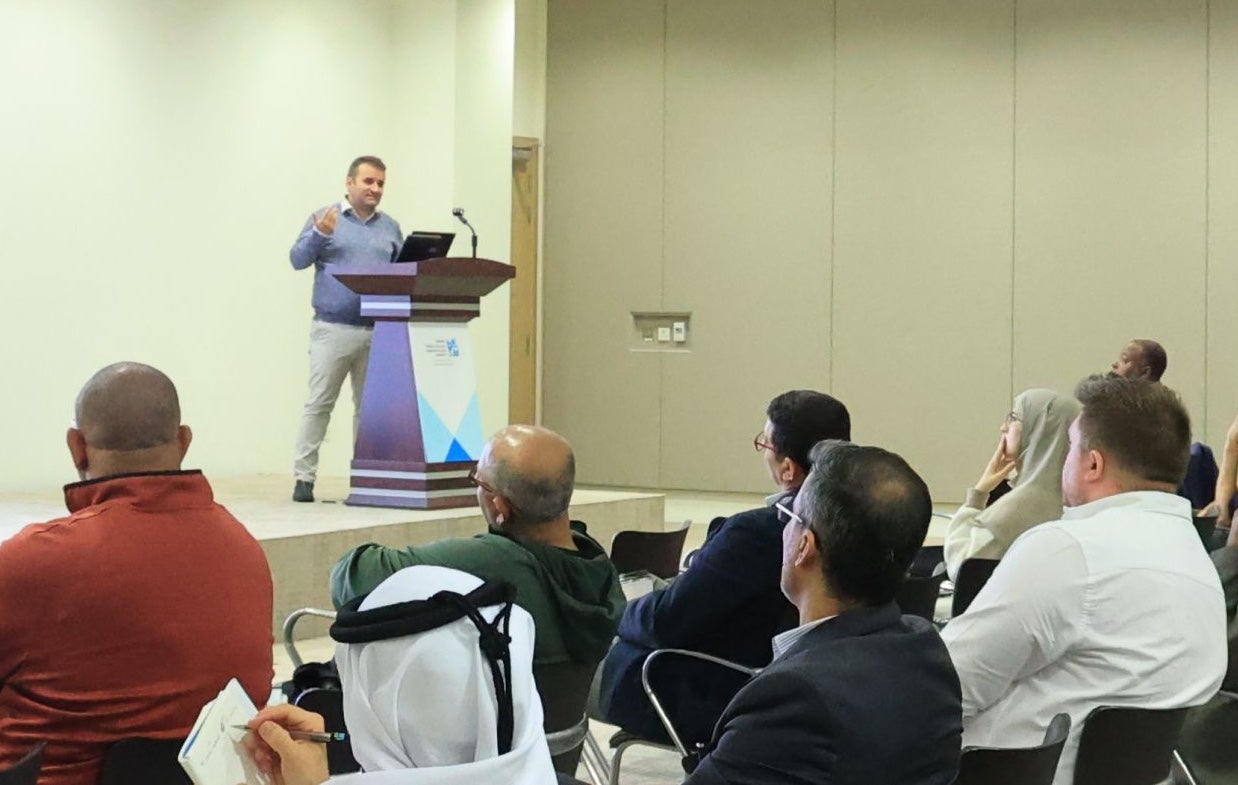
HBKU Contributes Expertise at COP 29
Faculty and staff join Qatari delegation to global climate conference
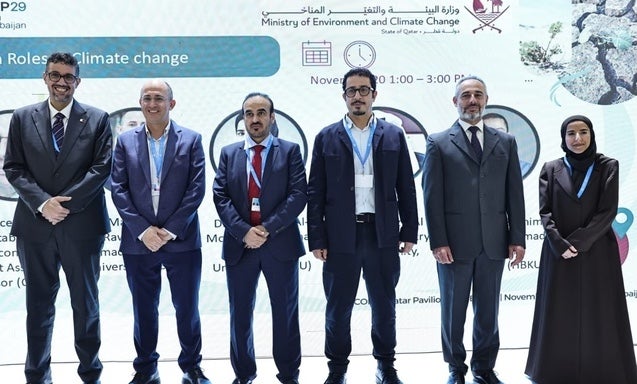
Hamad Bin Khalifa University (HBKU) joined the State of Qatar’s delegation at the 2024 United Nations Climate Change Conference (COP29) in Baku, Azerbaijan, to contribute its institutional expertise in support of the global community’s climate goals.
From November 11 - 22, members of the College of Science and Engineering (CSE) and Qatar Environment and Energy Institute (QEERI) delivered talks at the Qatar Foundation (QF) section of the Ministry of Environment and Climate Change’s (MECC) Qatar Pavilion and engaged in international knowledge exchanges. Presentations particularly focused on innovative solutions for issues related to the conference’s themes of Urbanization, Transportation, and Oceans.
Reflecting on COP 29, Dr. Mounir Hamdi, Dean, CSE, said: “Through our mutual commitment to fighting climate change - a critical challenge facing Qatar and the world - HBKU partnered with MECC and QF to participate in contemporary discussions on how we can collectively meet climate goals. As a leader in education and research based in Qatar, the university has directly supported the country’s efforts against climate change by bolstering the development of its national research capabilities while also contributing novel solutions in this field.”
Faculty and staff showcased collaborations at the conference at several sessions, including “Meeting the IMO Carbon Neutrality Targets: Carbon Capture onboard Large Ships,” which highlighted a collaboration between CSE, the American Bureau of Shipping and QatarEnergy LNG that compared promising carbon capture technologies for liquefied natural gas carriers. In “Reductions in Global Emissions to Keep Temperature Increases Below 1.5°C: ENV-Climate Change,” QEERI presented Qatar TIMES, a computer-based model that can help inform the country’s climate change policy, developed in collaboration with Qatar General Electricity and Water Corporation (Kahramaa) and Imperial College London Qatar.
HBKU also exhibited several in-house projects. “Optimizing AI for Sustainability: Reducing Carbon Footprints in Large Language Models,” outlined CSE research on how artificial intelligence can help reduce energy consumption, while “Sustainable Management of End of Life Reverse Osmosis Membranes for Water Security” detailed a CSE-developed approach to recycling membranes used for water treatment across multiple industries. “Towards Environmental Sustainability and Circular Economy: Pathways for Converting Waste Plastic into High Value Products” explained a CSE project aimed at recycling discarded polyethylene (PE) and Polyethylene terephthalate (PET) plastics.
Commenting on HBKU’s participation, Dr. Tareq Al Ansari, Acting Executive Director, QEERI, said: “COP 29 was an opportunity for HBKU to demonstrate how it supports Qatar’s vibrant research and development ecosystem by leveraging synergies with renowned partners in the country and around the world in service of national and international priorities. It also gave our international peers a glimpse into how the university empowers its faculty and researchers to achieve the impact they strive for in their chosen fields.”
HBKU previously supported the State of Qatar at multiple editions of the Conference, underlining its partnership with the country as it works with local and international partners to help meet global climate goals. It remains dedicated to directing its institutional capacities to working with MECC, QF, and other key partners in future editions of COP, helping to shape novel solutions that hold global impact.
Related News
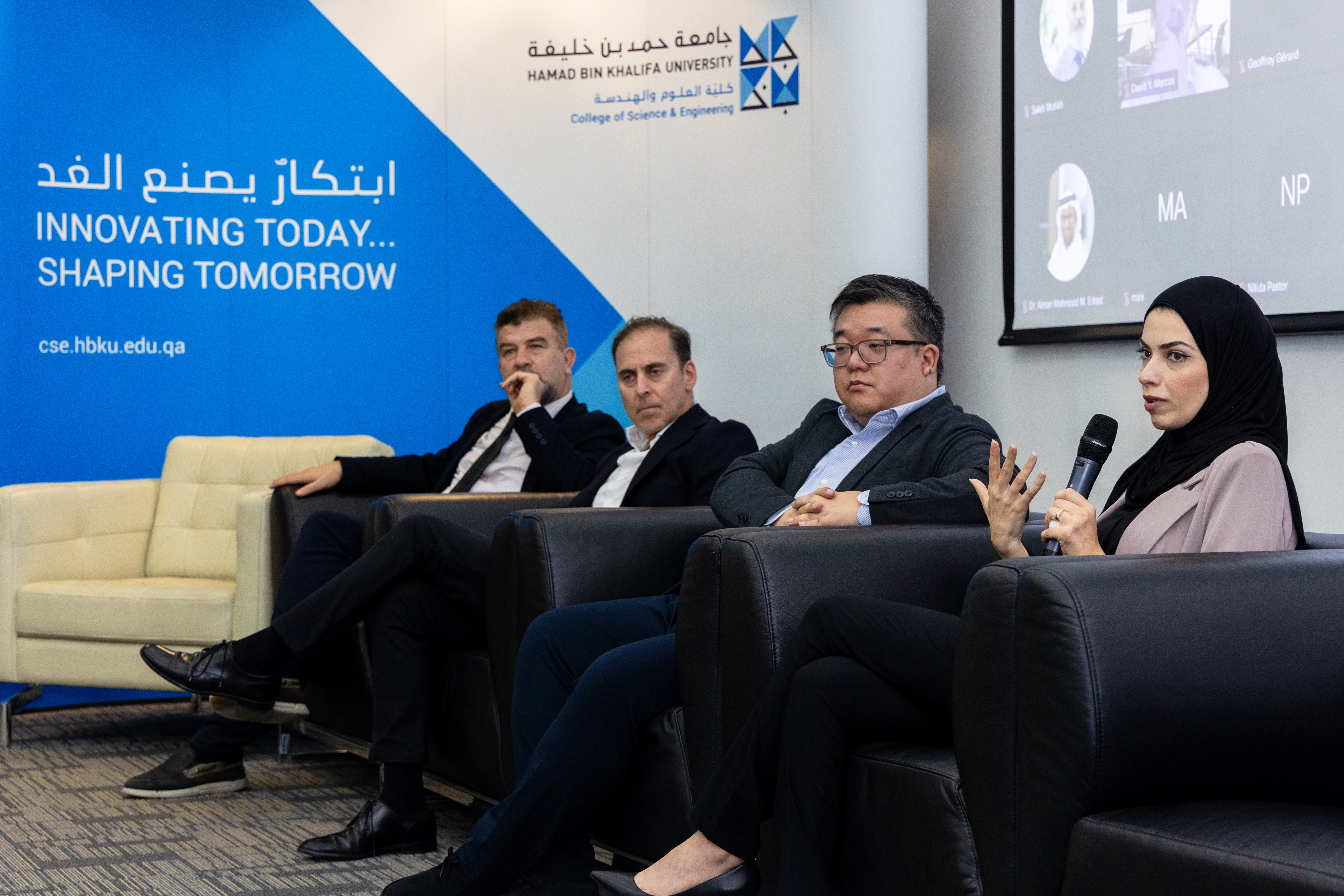
HBKU’s CSE and IE Impact Xcelerator Host Healthcare and Technology Collider Roundtable
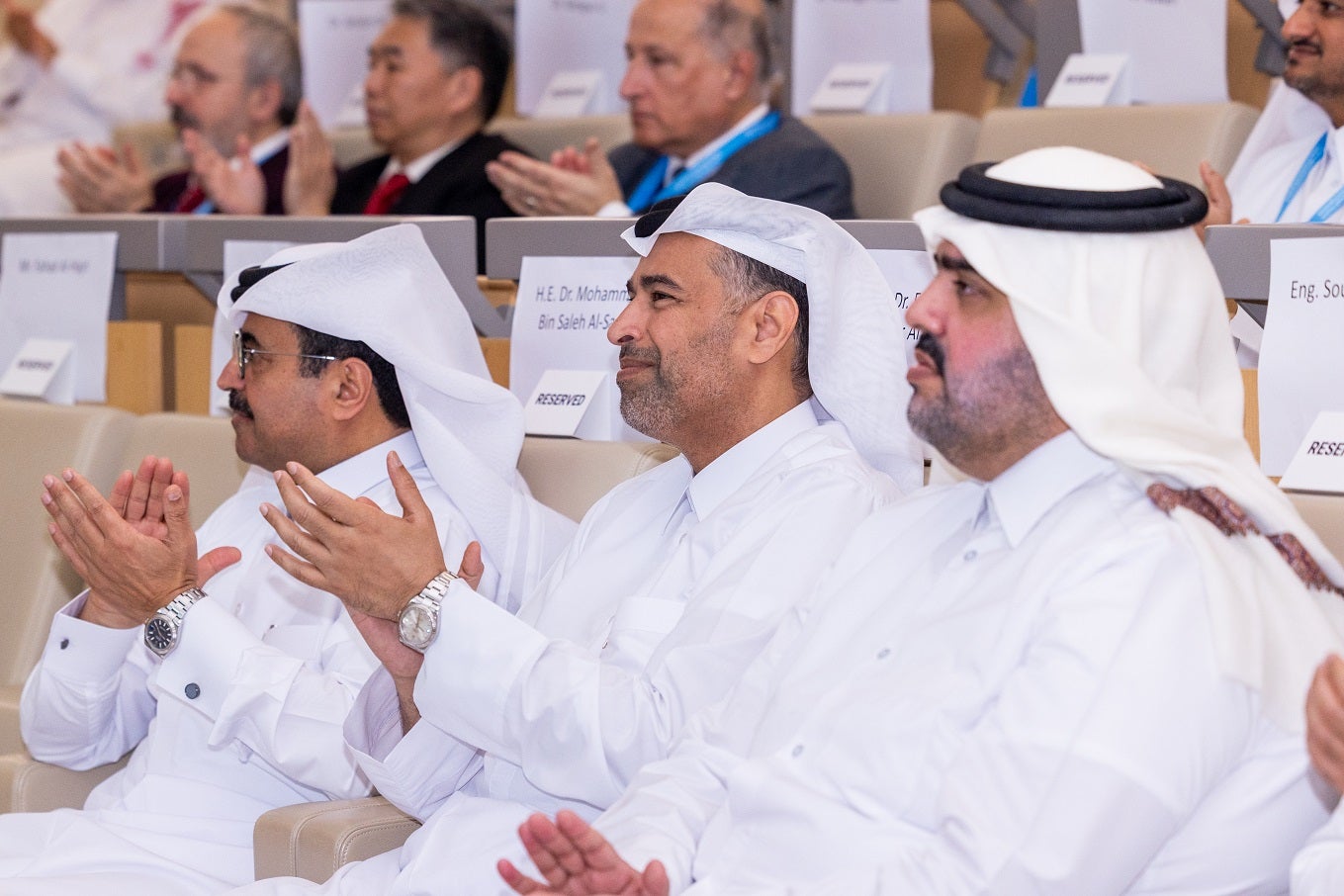
HBKU’s CSE Hosts 14th International Conference on Hydrogen Production (ICH2P-2023)
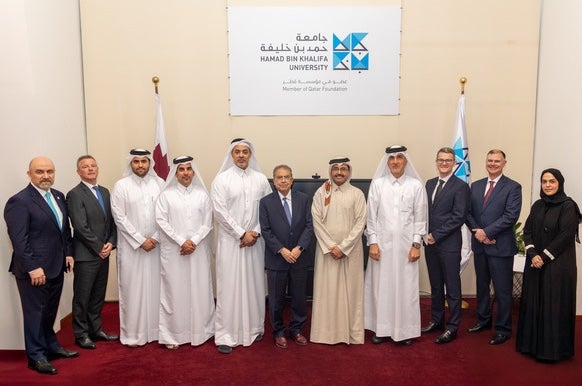
HBKU’s College of Science and Engineering Organizes First Industry and Government Advisory Board Meeting
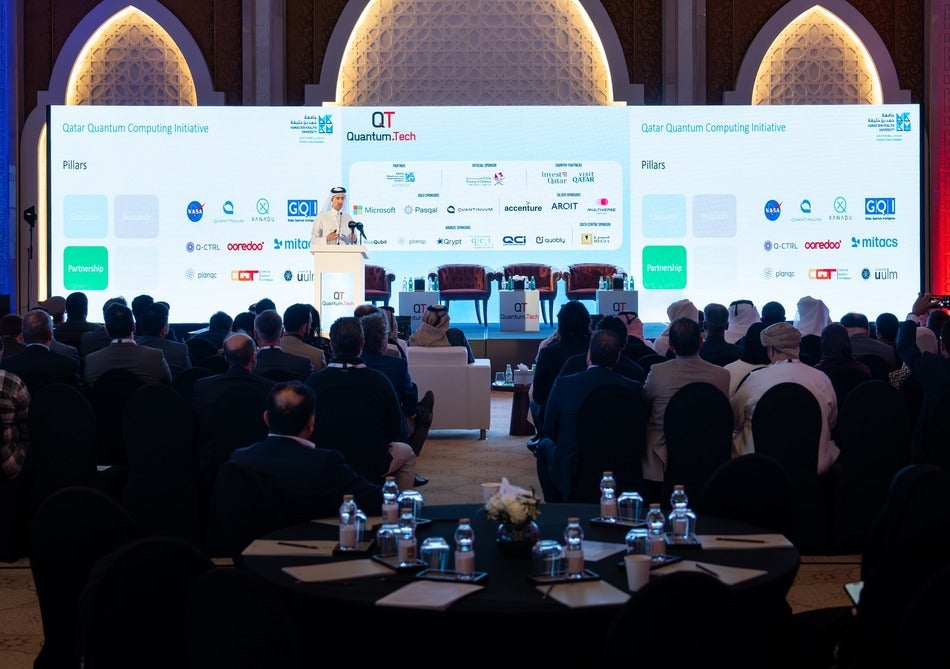
HBKU and Quantum.Tech Bring Major Quantum Event to the Middle East for the First Time
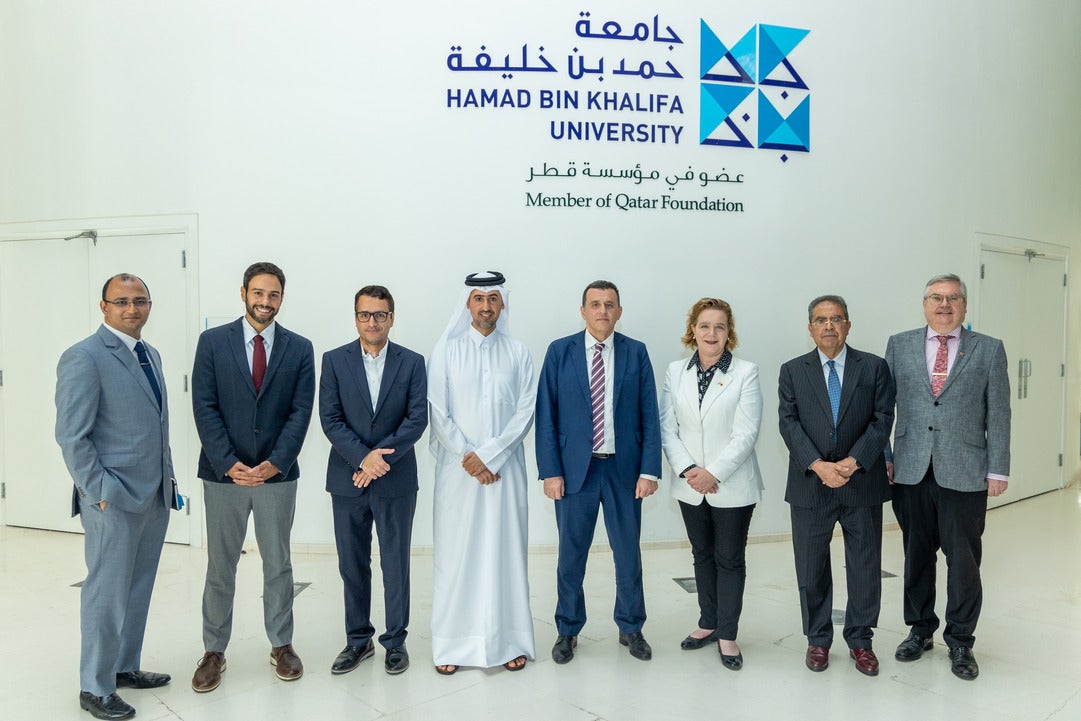
HBKU Signs Memorandum of Understanding with Canada’s Leading Innovation Organization

Hamad Bin Khalifa University and Quantinuum Partner to Advance Quantum Computing in Qatar
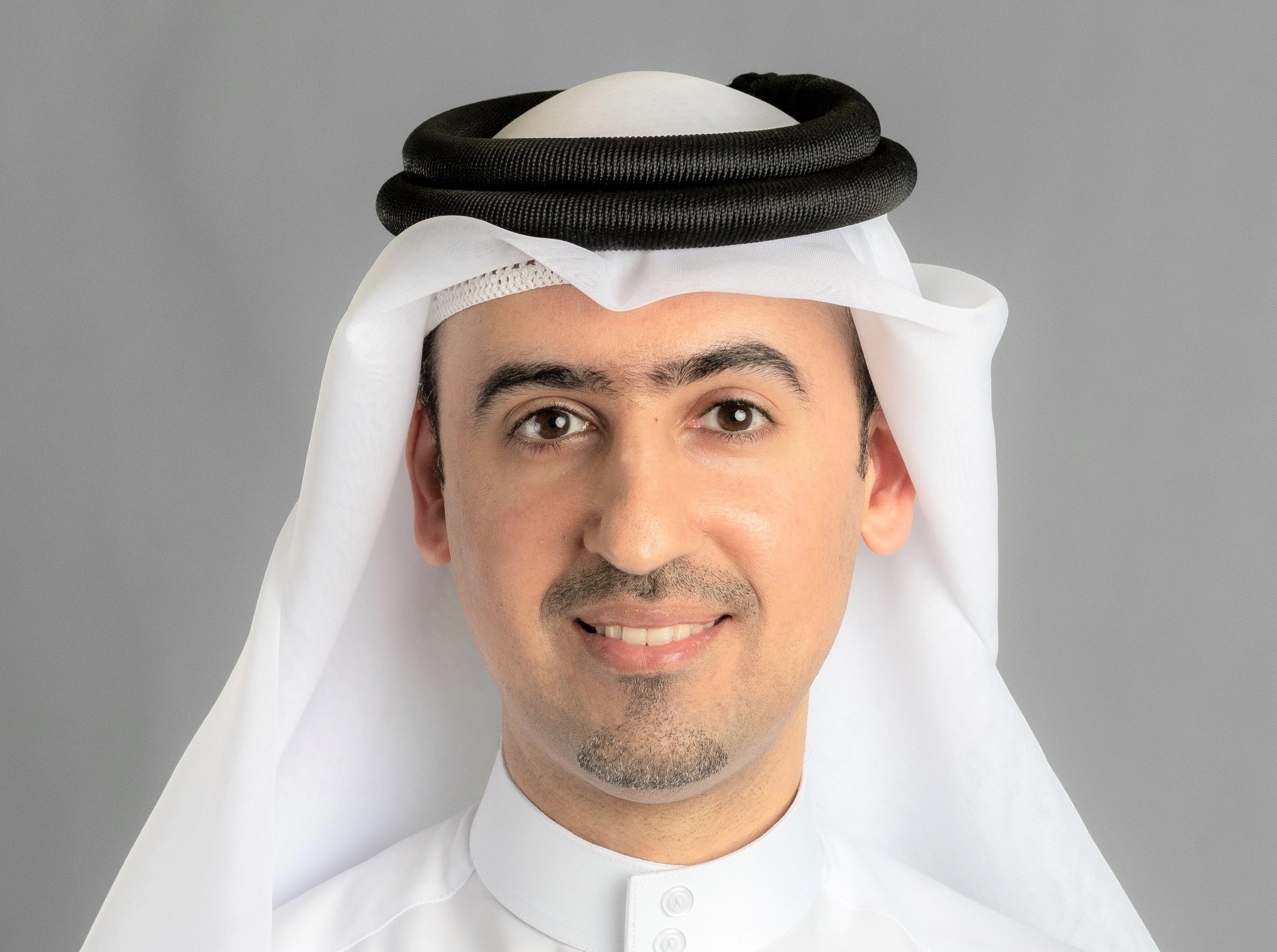
HBKU’s College of Science and Engineering Signs Memorandum of Understanding with NASA on Quantum Research and Education
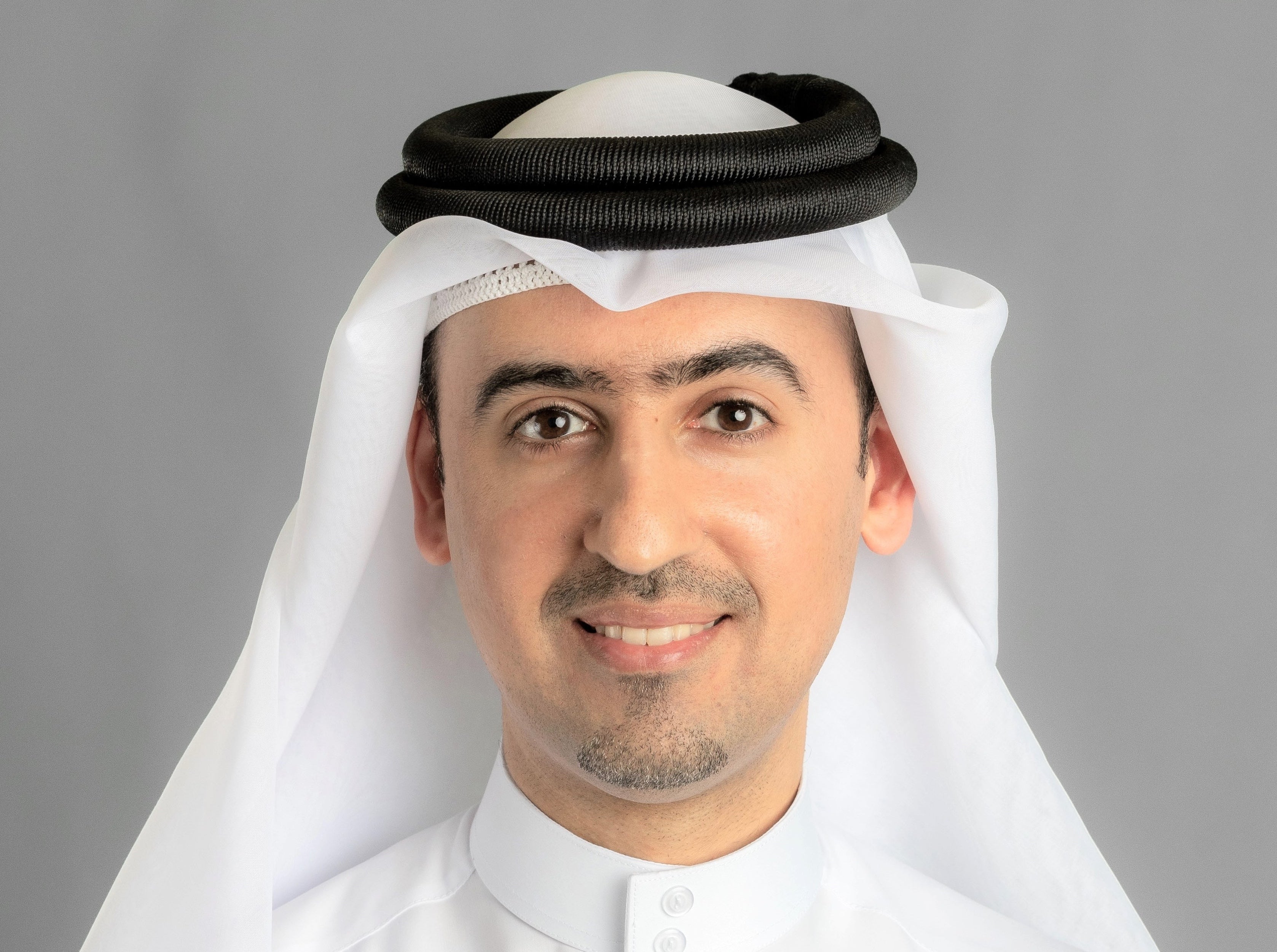
Q-CTRL and Hamad Bin Khalifa University’s College of Science and Engineering Partner to Equip the Next Generation Quantum Workforce in Qatar
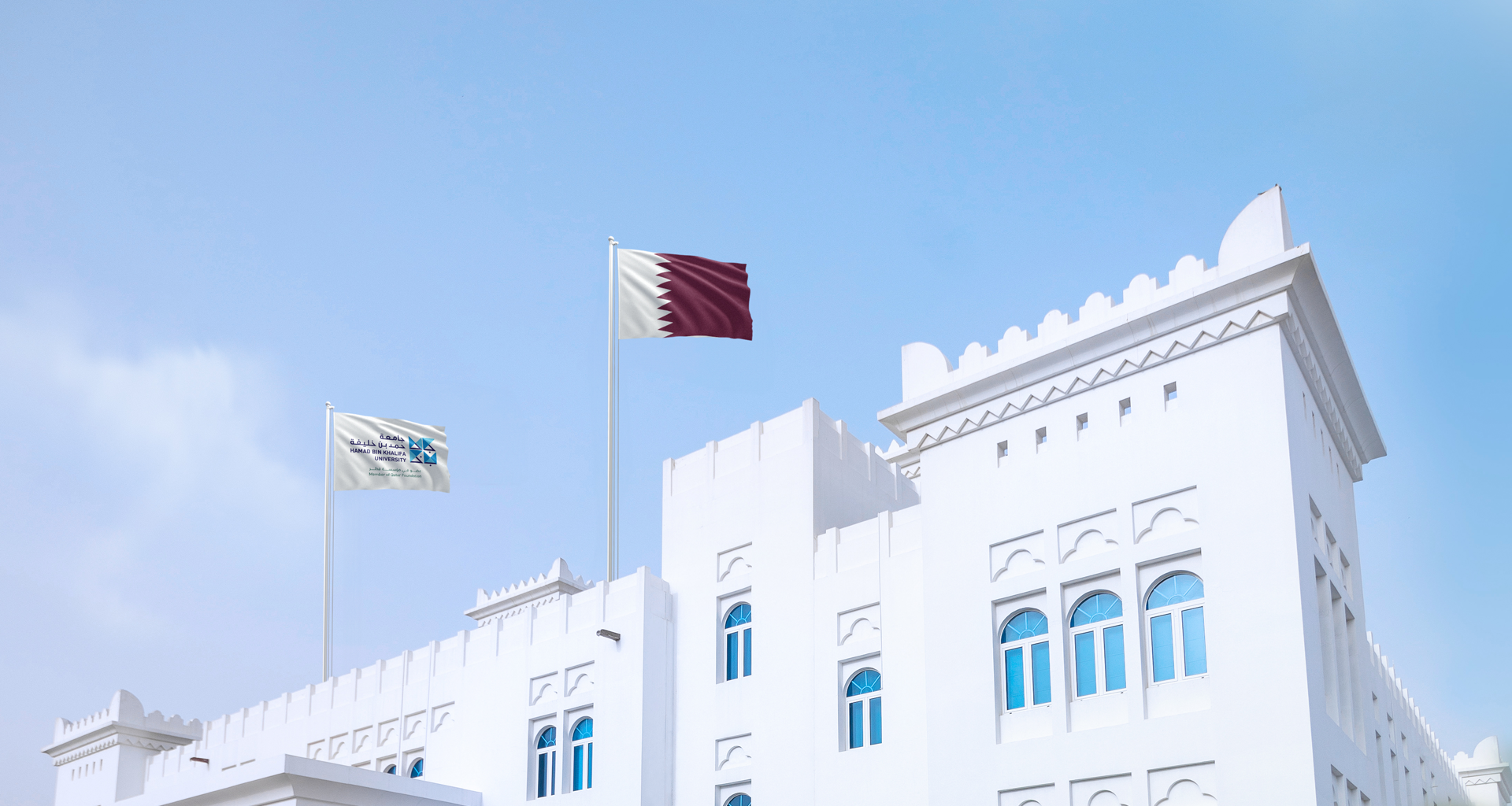
QF’s Hamad Bin Khalifa University to Offer Undergraduate Engineering Programs in Education City

HBKU’s CSE and IE Impact Xcelerator Host Healthcare and Technology Collider Roundtable

HBKU’s CSE Hosts 14th International Conference on Hydrogen Production (ICH2P-2023)

HBKU’s College of Science and Engineering Organizes First Industry and Government Advisory Board Meeting

HBKU and Quantum.Tech Bring Major Quantum Event to the Middle East for the First Time

HBKU Signs Memorandum of Understanding with Canada’s Leading Innovation Organization

Hamad Bin Khalifa University and Quantinuum Partner to Advance Quantum Computing in Qatar

HBKU’s College of Science and Engineering Signs Memorandum of Understanding with NASA on Quantum Research and Education

Q-CTRL and Hamad Bin Khalifa University’s College of Science and Engineering Partner to Equip the Next Generation Quantum Workforce in Qatar

QF’s Hamad Bin Khalifa University to Offer Undergraduate Engineering Programs in Education City

HBKU’s CSE and IE Impact Xcelerator Host Healthcare and Technology Collider Roundtable

HBKU’s CSE Hosts 14th International Conference on Hydrogen Production (ICH2P-2023)

HBKU’s College of Science and Engineering Organizes First Industry and Government Advisory Board Meeting

HBKU and Quantum.Tech Bring Major Quantum Event to the Middle East for the First Time

HBKU Signs Memorandum of Understanding with Canada’s Leading Innovation Organization

Hamad Bin Khalifa University and Quantinuum Partner to Advance Quantum Computing in Qatar

HBKU’s College of Science and Engineering Signs Memorandum of Understanding with NASA on Quantum Research and Education

Q-CTRL and Hamad Bin Khalifa University’s College of Science and Engineering Partner to Equip the Next Generation Quantum Workforce in Qatar

QF’s Hamad Bin Khalifa University to Offer Undergraduate Engineering Programs in Education City

HBKU’s CSE and IE Impact Xcelerator Host Healthcare and Technology Collider Roundtable

HBKU’s CSE Hosts 14th International Conference on Hydrogen Production (ICH2P-2023)

HBKU’s College of Science and Engineering Organizes First Industry and Government Advisory Board Meeting

HBKU and Quantum.Tech Bring Major Quantum Event to the Middle East for the First Time

HBKU Signs Memorandum of Understanding with Canada’s Leading Innovation Organization

Hamad Bin Khalifa University and Quantinuum Partner to Advance Quantum Computing in Qatar

HBKU’s College of Science and Engineering Signs Memorandum of Understanding with NASA on Quantum Research and Education

Q-CTRL and Hamad Bin Khalifa University’s College of Science and Engineering Partner to Equip the Next Generation Quantum Workforce in Qatar

QF’s Hamad Bin Khalifa University to Offer Undergraduate Engineering Programs in Education City

HBKU’s CSE and IE Impact Xcelerator Host Healthcare and Technology Collider Roundtable

HBKU’s CSE Hosts 14th International Conference on Hydrogen Production (ICH2P-2023)

HBKU’s College of Science and Engineering Organizes First Industry and Government Advisory Board Meeting

HBKU and Quantum.Tech Bring Major Quantum Event to the Middle East for the First Time

HBKU Signs Memorandum of Understanding with Canada’s Leading Innovation Organization

Hamad Bin Khalifa University and Quantinuum Partner to Advance Quantum Computing in Qatar

HBKU’s College of Science and Engineering Signs Memorandum of Understanding with NASA on Quantum Research and Education

Q-CTRL and Hamad Bin Khalifa University’s College of Science and Engineering Partner to Equip the Next Generation Quantum Workforce in Qatar

QF’s Hamad Bin Khalifa University to Offer Undergraduate Engineering Programs in Education City

HBKU’s CSE and IE Impact Xcelerator Host Healthcare and Technology Collider Roundtable

HBKU’s CSE Hosts 14th International Conference on Hydrogen Production (ICH2P-2023)

HBKU’s College of Science and Engineering Organizes First Industry and Government Advisory Board Meeting

HBKU and Quantum.Tech Bring Major Quantum Event to the Middle East for the First Time

HBKU Signs Memorandum of Understanding with Canada’s Leading Innovation Organization

Hamad Bin Khalifa University and Quantinuum Partner to Advance Quantum Computing in Qatar

HBKU’s College of Science and Engineering Signs Memorandum of Understanding with NASA on Quantum Research and Education

Q-CTRL and Hamad Bin Khalifa University’s College of Science and Engineering Partner to Equip the Next Generation Quantum Workforce in Qatar

QF’s Hamad Bin Khalifa University to Offer Undergraduate Engineering Programs in Education City

HBKU’s CSE and IE Impact Xcelerator Host Healthcare and Technology Collider Roundtable

HBKU’s CSE Hosts 14th International Conference on Hydrogen Production (ICH2P-2023)

HBKU’s College of Science and Engineering Organizes First Industry and Government Advisory Board Meeting

HBKU and Quantum.Tech Bring Major Quantum Event to the Middle East for the First Time

HBKU Signs Memorandum of Understanding with Canada’s Leading Innovation Organization

Hamad Bin Khalifa University and Quantinuum Partner to Advance Quantum Computing in Qatar

HBKU’s College of Science and Engineering Signs Memorandum of Understanding with NASA on Quantum Research and Education

Q-CTRL and Hamad Bin Khalifa University’s College of Science and Engineering Partner to Equip the Next Generation Quantum Workforce in Qatar

QF’s Hamad Bin Khalifa University to Offer Undergraduate Engineering Programs in Education City

HBKU’s CSE and IE Impact Xcelerator Host Healthcare and Technology Collider Roundtable

HBKU’s CSE Hosts 14th International Conference on Hydrogen Production (ICH2P-2023)

HBKU’s College of Science and Engineering Organizes First Industry and Government Advisory Board Meeting

HBKU and Quantum.Tech Bring Major Quantum Event to the Middle East for the First Time

HBKU Signs Memorandum of Understanding with Canada’s Leading Innovation Organization

Hamad Bin Khalifa University and Quantinuum Partner to Advance Quantum Computing in Qatar

HBKU’s College of Science and Engineering Signs Memorandum of Understanding with NASA on Quantum Research and Education

Q-CTRL and Hamad Bin Khalifa University’s College of Science and Engineering Partner to Equip the Next Generation Quantum Workforce in Qatar

QF’s Hamad Bin Khalifa University to Offer Undergraduate Engineering Programs in Education City

HBKU’s CSE and IE Impact Xcelerator Host Healthcare and Technology Collider Roundtable

HBKU’s CSE Hosts 14th International Conference on Hydrogen Production (ICH2P-2023)

HBKU’s College of Science and Engineering Organizes First Industry and Government Advisory Board Meeting

HBKU and Quantum.Tech Bring Major Quantum Event to the Middle East for the First Time

HBKU Signs Memorandum of Understanding with Canada’s Leading Innovation Organization

Hamad Bin Khalifa University and Quantinuum Partner to Advance Quantum Computing in Qatar

HBKU’s College of Science and Engineering Signs Memorandum of Understanding with NASA on Quantum Research and Education

Q-CTRL and Hamad Bin Khalifa University’s College of Science and Engineering Partner to Equip the Next Generation Quantum Workforce in Qatar

QF’s Hamad Bin Khalifa University to Offer Undergraduate Engineering Programs in Education City

HBKU’s CSE and IE Impact Xcelerator Host Healthcare and Technology Collider Roundtable

HBKU’s CSE Hosts 14th International Conference on Hydrogen Production (ICH2P-2023)

HBKU’s College of Science and Engineering Organizes First Industry and Government Advisory Board Meeting

HBKU and Quantum.Tech Bring Major Quantum Event to the Middle East for the First Time

HBKU Signs Memorandum of Understanding with Canada’s Leading Innovation Organization

Hamad Bin Khalifa University and Quantinuum Partner to Advance Quantum Computing in Qatar

HBKU’s College of Science and Engineering Signs Memorandum of Understanding with NASA on Quantum Research and Education

Q-CTRL and Hamad Bin Khalifa University’s College of Science and Engineering Partner to Equip the Next Generation Quantum Workforce in Qatar

QF’s Hamad Bin Khalifa University to Offer Undergraduate Engineering Programs in Education City

HBKU’s CSE and IE Impact Xcelerator Host Healthcare and Technology Collider Roundtable

HBKU’s CSE Hosts 14th International Conference on Hydrogen Production (ICH2P-2023)

HBKU’s College of Science and Engineering Organizes First Industry and Government Advisory Board Meeting

HBKU and Quantum.Tech Bring Major Quantum Event to the Middle East for the First Time

HBKU Signs Memorandum of Understanding with Canada’s Leading Innovation Organization

Hamad Bin Khalifa University and Quantinuum Partner to Advance Quantum Computing in Qatar

HBKU’s College of Science and Engineering Signs Memorandum of Understanding with NASA on Quantum Research and Education

Q-CTRL and Hamad Bin Khalifa University’s College of Science and Engineering Partner to Equip the Next Generation Quantum Workforce in Qatar

QF’s Hamad Bin Khalifa University to Offer Undergraduate Engineering Programs in Education City

HBKU’s CSE and IE Impact Xcelerator Host Healthcare and Technology Collider Roundtable

HBKU’s CSE Hosts 14th International Conference on Hydrogen Production (ICH2P-2023)

HBKU’s College of Science and Engineering Organizes First Industry and Government Advisory Board Meeting

HBKU and Quantum.Tech Bring Major Quantum Event to the Middle East for the First Time

HBKU Signs Memorandum of Understanding with Canada’s Leading Innovation Organization

Hamad Bin Khalifa University and Quantinuum Partner to Advance Quantum Computing in Qatar

HBKU’s College of Science and Engineering Signs Memorandum of Understanding with NASA on Quantum Research and Education

Q-CTRL and Hamad Bin Khalifa University’s College of Science and Engineering Partner to Equip the Next Generation Quantum Workforce in Qatar

QF’s Hamad Bin Khalifa University to Offer Undergraduate Engineering Programs in Education City

HBKU’s CSE and IE Impact Xcelerator Host Healthcare and Technology Collider Roundtable

HBKU’s CSE Hosts 14th International Conference on Hydrogen Production (ICH2P-2023)

HBKU’s College of Science and Engineering Organizes First Industry and Government Advisory Board Meeting

HBKU and Quantum.Tech Bring Major Quantum Event to the Middle East for the First Time

HBKU Signs Memorandum of Understanding with Canada’s Leading Innovation Organization

Hamad Bin Khalifa University and Quantinuum Partner to Advance Quantum Computing in Qatar

HBKU’s College of Science and Engineering Signs Memorandum of Understanding with NASA on Quantum Research and Education

Q-CTRL and Hamad Bin Khalifa University’s College of Science and Engineering Partner to Equip the Next Generation Quantum Workforce in Qatar

QF’s Hamad Bin Khalifa University to Offer Undergraduate Engineering Programs in Education City

HBKU’s CSE and IE Impact Xcelerator Host Healthcare and Technology Collider Roundtable

HBKU’s CSE Hosts 14th International Conference on Hydrogen Production (ICH2P-2023)

HBKU’s College of Science and Engineering Organizes First Industry and Government Advisory Board Meeting

HBKU and Quantum.Tech Bring Major Quantum Event to the Middle East for the First Time

HBKU Signs Memorandum of Understanding with Canada’s Leading Innovation Organization

Hamad Bin Khalifa University and Quantinuum Partner to Advance Quantum Computing in Qatar

HBKU’s College of Science and Engineering Signs Memorandum of Understanding with NASA on Quantum Research and Education

Q-CTRL and Hamad Bin Khalifa University’s College of Science and Engineering Partner to Equip the Next Generation Quantum Workforce in Qatar

QF’s Hamad Bin Khalifa University to Offer Undergraduate Engineering Programs in Education City

HBKU’s CSE and IE Impact Xcelerator Host Healthcare and Technology Collider Roundtable

HBKU’s CSE Hosts 14th International Conference on Hydrogen Production (ICH2P-2023)

HBKU’s College of Science and Engineering Organizes First Industry and Government Advisory Board Meeting

HBKU and Quantum.Tech Bring Major Quantum Event to the Middle East for the First Time

HBKU Signs Memorandum of Understanding with Canada’s Leading Innovation Organization

Hamad Bin Khalifa University and Quantinuum Partner to Advance Quantum Computing in Qatar

HBKU’s College of Science and Engineering Signs Memorandum of Understanding with NASA on Quantum Research and Education

Q-CTRL and Hamad Bin Khalifa University’s College of Science and Engineering Partner to Equip the Next Generation Quantum Workforce in Qatar

QF’s Hamad Bin Khalifa University to Offer Undergraduate Engineering Programs in Education City

HBKU’s CSE and IE Impact Xcelerator Host Healthcare and Technology Collider Roundtable

HBKU’s CSE Hosts 14th International Conference on Hydrogen Production (ICH2P-2023)

HBKU’s College of Science and Engineering Organizes First Industry and Government Advisory Board Meeting

HBKU and Quantum.Tech Bring Major Quantum Event to the Middle East for the First Time

HBKU Signs Memorandum of Understanding with Canada’s Leading Innovation Organization

Hamad Bin Khalifa University and Quantinuum Partner to Advance Quantum Computing in Qatar

HBKU’s College of Science and Engineering Signs Memorandum of Understanding with NASA on Quantum Research and Education

Q-CTRL and Hamad Bin Khalifa University’s College of Science and Engineering Partner to Equip the Next Generation Quantum Workforce in Qatar

QF’s Hamad Bin Khalifa University to Offer Undergraduate Engineering Programs in Education City

HBKU’s CSE and IE Impact Xcelerator Host Healthcare and Technology Collider Roundtable

HBKU’s CSE Hosts 14th International Conference on Hydrogen Production (ICH2P-2023)

HBKU’s College of Science and Engineering Organizes First Industry and Government Advisory Board Meeting

HBKU and Quantum.Tech Bring Major Quantum Event to the Middle East for the First Time

HBKU Signs Memorandum of Understanding with Canada’s Leading Innovation Organization

Hamad Bin Khalifa University and Quantinuum Partner to Advance Quantum Computing in Qatar

HBKU’s College of Science and Engineering Signs Memorandum of Understanding with NASA on Quantum Research and Education

Q-CTRL and Hamad Bin Khalifa University’s College of Science and Engineering Partner to Equip the Next Generation Quantum Workforce in Qatar

QF’s Hamad Bin Khalifa University to Offer Undergraduate Engineering Programs in Education City

HBKU’s CSE and IE Impact Xcelerator Host Healthcare and Technology Collider Roundtable

HBKU’s CSE Hosts 14th International Conference on Hydrogen Production (ICH2P-2023)

HBKU’s College of Science and Engineering Organizes First Industry and Government Advisory Board Meeting

HBKU and Quantum.Tech Bring Major Quantum Event to the Middle East for the First Time

HBKU Signs Memorandum of Understanding with Canada’s Leading Innovation Organization

Hamad Bin Khalifa University and Quantinuum Partner to Advance Quantum Computing in Qatar

HBKU’s College of Science and Engineering Signs Memorandum of Understanding with NASA on Quantum Research and Education

Q-CTRL and Hamad Bin Khalifa University’s College of Science and Engineering Partner to Equip the Next Generation Quantum Workforce in Qatar

QF’s Hamad Bin Khalifa University to Offer Undergraduate Engineering Programs in Education City

HBKU’s CSE and IE Impact Xcelerator Host Healthcare and Technology Collider Roundtable

HBKU’s CSE Hosts 14th International Conference on Hydrogen Production (ICH2P-2023)

HBKU’s College of Science and Engineering Organizes First Industry and Government Advisory Board Meeting

HBKU and Quantum.Tech Bring Major Quantum Event to the Middle East for the First Time

HBKU Signs Memorandum of Understanding with Canada’s Leading Innovation Organization

Hamad Bin Khalifa University and Quantinuum Partner to Advance Quantum Computing in Qatar

HBKU’s College of Science and Engineering Signs Memorandum of Understanding with NASA on Quantum Research and Education

Q-CTRL and Hamad Bin Khalifa University’s College of Science and Engineering Partner to Equip the Next Generation Quantum Workforce in Qatar

QF’s Hamad Bin Khalifa University to Offer Undergraduate Engineering Programs in Education City

HBKU’s CSE and IE Impact Xcelerator Host Healthcare and Technology Collider Roundtable

HBKU’s CSE Hosts 14th International Conference on Hydrogen Production (ICH2P-2023)

HBKU’s College of Science and Engineering Organizes First Industry and Government Advisory Board Meeting

HBKU and Quantum.Tech Bring Major Quantum Event to the Middle East for the First Time

HBKU Signs Memorandum of Understanding with Canada’s Leading Innovation Organization

Hamad Bin Khalifa University and Quantinuum Partner to Advance Quantum Computing in Qatar

HBKU’s College of Science and Engineering Signs Memorandum of Understanding with NASA on Quantum Research and Education

Q-CTRL and Hamad Bin Khalifa University’s College of Science and Engineering Partner to Equip the Next Generation Quantum Workforce in Qatar

QF’s Hamad Bin Khalifa University to Offer Undergraduate Engineering Programs in Education City

HBKU’s CSE and IE Impact Xcelerator Host Healthcare and Technology Collider Roundtable

HBKU’s CSE Hosts 14th International Conference on Hydrogen Production (ICH2P-2023)

HBKU’s College of Science and Engineering Organizes First Industry and Government Advisory Board Meeting

HBKU and Quantum.Tech Bring Major Quantum Event to the Middle East for the First Time

HBKU Signs Memorandum of Understanding with Canada’s Leading Innovation Organization

Hamad Bin Khalifa University and Quantinuum Partner to Advance Quantum Computing in Qatar

HBKU’s College of Science and Engineering Signs Memorandum of Understanding with NASA on Quantum Research and Education

Q-CTRL and Hamad Bin Khalifa University’s College of Science and Engineering Partner to Equip the Next Generation Quantum Workforce in Qatar

QF’s Hamad Bin Khalifa University to Offer Undergraduate Engineering Programs in Education City

HBKU’s CSE and IE Impact Xcelerator Host Healthcare and Technology Collider Roundtable

HBKU’s CSE Hosts 14th International Conference on Hydrogen Production (ICH2P-2023)

HBKU’s College of Science and Engineering Organizes First Industry and Government Advisory Board Meeting

HBKU and Quantum.Tech Bring Major Quantum Event to the Middle East for the First Time

HBKU Signs Memorandum of Understanding with Canada’s Leading Innovation Organization

Hamad Bin Khalifa University and Quantinuum Partner to Advance Quantum Computing in Qatar

HBKU’s College of Science and Engineering Signs Memorandum of Understanding with NASA on Quantum Research and Education

Q-CTRL and Hamad Bin Khalifa University’s College of Science and Engineering Partner to Equip the Next Generation Quantum Workforce in Qatar

QF’s Hamad Bin Khalifa University to Offer Undergraduate Engineering Programs in Education City

HBKU’s CSE and IE Impact Xcelerator Host Healthcare and Technology Collider Roundtable

HBKU’s CSE Hosts 14th International Conference on Hydrogen Production (ICH2P-2023)

HBKU’s College of Science and Engineering Organizes First Industry and Government Advisory Board Meeting

HBKU and Quantum.Tech Bring Major Quantum Event to the Middle East for the First Time

HBKU Signs Memorandum of Understanding with Canada’s Leading Innovation Organization

Hamad Bin Khalifa University and Quantinuum Partner to Advance Quantum Computing in Qatar

HBKU’s College of Science and Engineering Signs Memorandum of Understanding with NASA on Quantum Research and Education

Q-CTRL and Hamad Bin Khalifa University’s College of Science and Engineering Partner to Equip the Next Generation Quantum Workforce in Qatar

QF’s Hamad Bin Khalifa University to Offer Undergraduate Engineering Programs in Education City

HBKU’s CSE and IE Impact Xcelerator Host Healthcare and Technology Collider Roundtable

HBKU’s CSE Hosts 14th International Conference on Hydrogen Production (ICH2P-2023)

HBKU’s College of Science and Engineering Organizes First Industry and Government Advisory Board Meeting

HBKU and Quantum.Tech Bring Major Quantum Event to the Middle East for the First Time

HBKU Signs Memorandum of Understanding with Canada’s Leading Innovation Organization

Hamad Bin Khalifa University and Quantinuum Partner to Advance Quantum Computing in Qatar

HBKU’s College of Science and Engineering Signs Memorandum of Understanding with NASA on Quantum Research and Education

Q-CTRL and Hamad Bin Khalifa University’s College of Science and Engineering Partner to Equip the Next Generation Quantum Workforce in Qatar

QF’s Hamad Bin Khalifa University to Offer Undergraduate Engineering Programs in Education City

HBKU’s CSE and IE Impact Xcelerator Host Healthcare and Technology Collider Roundtable

HBKU’s CSE Hosts 14th International Conference on Hydrogen Production (ICH2P-2023)

HBKU’s College of Science and Engineering Organizes First Industry and Government Advisory Board Meeting

HBKU and Quantum.Tech Bring Major Quantum Event to the Middle East for the First Time

HBKU Signs Memorandum of Understanding with Canada’s Leading Innovation Organization

Hamad Bin Khalifa University and Quantinuum Partner to Advance Quantum Computing in Qatar

HBKU’s College of Science and Engineering Signs Memorandum of Understanding with NASA on Quantum Research and Education

Q-CTRL and Hamad Bin Khalifa University’s College of Science and Engineering Partner to Equip the Next Generation Quantum Workforce in Qatar

QF’s Hamad Bin Khalifa University to Offer Undergraduate Engineering Programs in Education City

HBKU’s CSE and IE Impact Xcelerator Host Healthcare and Technology Collider Roundtable

HBKU’s CSE Hosts 14th International Conference on Hydrogen Production (ICH2P-2023)

HBKU’s College of Science and Engineering Organizes First Industry and Government Advisory Board Meeting

HBKU and Quantum.Tech Bring Major Quantum Event to the Middle East for the First Time

HBKU Signs Memorandum of Understanding with Canada’s Leading Innovation Organization

Hamad Bin Khalifa University and Quantinuum Partner to Advance Quantum Computing in Qatar

HBKU’s College of Science and Engineering Signs Memorandum of Understanding with NASA on Quantum Research and Education

Q-CTRL and Hamad Bin Khalifa University’s College of Science and Engineering Partner to Equip the Next Generation Quantum Workforce in Qatar

QF’s Hamad Bin Khalifa University to Offer Undergraduate Engineering Programs in Education City

HBKU’s CSE and IE Impact Xcelerator Host Healthcare and Technology Collider Roundtable

HBKU’s CSE Hosts 14th International Conference on Hydrogen Production (ICH2P-2023)

HBKU’s College of Science and Engineering Organizes First Industry and Government Advisory Board Meeting

HBKU and Quantum.Tech Bring Major Quantum Event to the Middle East for the First Time

HBKU Signs Memorandum of Understanding with Canada’s Leading Innovation Organization

Hamad Bin Khalifa University and Quantinuum Partner to Advance Quantum Computing in Qatar

HBKU’s College of Science and Engineering Signs Memorandum of Understanding with NASA on Quantum Research and Education

Q-CTRL and Hamad Bin Khalifa University’s College of Science and Engineering Partner to Equip the Next Generation Quantum Workforce in Qatar

QF’s Hamad Bin Khalifa University to Offer Undergraduate Engineering Programs in Education City

HBKU’s CSE and IE Impact Xcelerator Host Healthcare and Technology Collider Roundtable

HBKU’s CSE Hosts 14th International Conference on Hydrogen Production (ICH2P-2023)

HBKU’s College of Science and Engineering Organizes First Industry and Government Advisory Board Meeting

HBKU and Quantum.Tech Bring Major Quantum Event to the Middle East for the First Time

HBKU Signs Memorandum of Understanding with Canada’s Leading Innovation Organization

Hamad Bin Khalifa University and Quantinuum Partner to Advance Quantum Computing in Qatar

HBKU’s College of Science and Engineering Signs Memorandum of Understanding with NASA on Quantum Research and Education

Q-CTRL and Hamad Bin Khalifa University’s College of Science and Engineering Partner to Equip the Next Generation Quantum Workforce in Qatar

QF’s Hamad Bin Khalifa University to Offer Undergraduate Engineering Programs in Education City

HBKU’s CSE and IE Impact Xcelerator Host Healthcare and Technology Collider Roundtable

HBKU’s CSE Hosts 14th International Conference on Hydrogen Production (ICH2P-2023)

HBKU’s College of Science and Engineering Organizes First Industry and Government Advisory Board Meeting

HBKU and Quantum.Tech Bring Major Quantum Event to the Middle East for the First Time

HBKU Signs Memorandum of Understanding with Canada’s Leading Innovation Organization

Hamad Bin Khalifa University and Quantinuum Partner to Advance Quantum Computing in Qatar

HBKU’s College of Science and Engineering Signs Memorandum of Understanding with NASA on Quantum Research and Education

Q-CTRL and Hamad Bin Khalifa University’s College of Science and Engineering Partner to Equip the Next Generation Quantum Workforce in Qatar

QF’s Hamad Bin Khalifa University to Offer Undergraduate Engineering Programs in Education City

HBKU’s CSE and IE Impact Xcelerator Host Healthcare and Technology Collider Roundtable

HBKU’s CSE Hosts 14th International Conference on Hydrogen Production (ICH2P-2023)

HBKU’s College of Science and Engineering Organizes First Industry and Government Advisory Board Meeting

HBKU and Quantum.Tech Bring Major Quantum Event to the Middle East for the First Time

HBKU Signs Memorandum of Understanding with Canada’s Leading Innovation Organization

Hamad Bin Khalifa University and Quantinuum Partner to Advance Quantum Computing in Qatar

HBKU’s College of Science and Engineering Signs Memorandum of Understanding with NASA on Quantum Research and Education

Q-CTRL and Hamad Bin Khalifa University’s College of Science and Engineering Partner to Equip the Next Generation Quantum Workforce in Qatar

QF’s Hamad Bin Khalifa University to Offer Undergraduate Engineering Programs in Education City

HBKU’s CSE and IE Impact Xcelerator Host Healthcare and Technology Collider Roundtable

HBKU’s CSE Hosts 14th International Conference on Hydrogen Production (ICH2P-2023)

HBKU’s College of Science and Engineering Organizes First Industry and Government Advisory Board Meeting

HBKU and Quantum.Tech Bring Major Quantum Event to the Middle East for the First Time

HBKU Signs Memorandum of Understanding with Canada’s Leading Innovation Organization

Hamad Bin Khalifa University and Quantinuum Partner to Advance Quantum Computing in Qatar

HBKU’s College of Science and Engineering Signs Memorandum of Understanding with NASA on Quantum Research and Education

Q-CTRL and Hamad Bin Khalifa University’s College of Science and Engineering Partner to Equip the Next Generation Quantum Workforce in Qatar

QF’s Hamad Bin Khalifa University to Offer Undergraduate Engineering Programs in Education City

HBKU’s CSE and IE Impact Xcelerator Host Healthcare and Technology Collider Roundtable

HBKU’s CSE Hosts 14th International Conference on Hydrogen Production (ICH2P-2023)

HBKU’s College of Science and Engineering Organizes First Industry and Government Advisory Board Meeting

HBKU and Quantum.Tech Bring Major Quantum Event to the Middle East for the First Time

HBKU Signs Memorandum of Understanding with Canada’s Leading Innovation Organization

Hamad Bin Khalifa University and Quantinuum Partner to Advance Quantum Computing in Qatar

HBKU’s College of Science and Engineering Signs Memorandum of Understanding with NASA on Quantum Research and Education

Q-CTRL and Hamad Bin Khalifa University’s College of Science and Engineering Partner to Equip the Next Generation Quantum Workforce in Qatar

QF’s Hamad Bin Khalifa University to Offer Undergraduate Engineering Programs in Education City

HBKU’s CSE and IE Impact Xcelerator Host Healthcare and Technology Collider Roundtable

HBKU’s CSE Hosts 14th International Conference on Hydrogen Production (ICH2P-2023)

HBKU’s College of Science and Engineering Organizes First Industry and Government Advisory Board Meeting

HBKU and Quantum.Tech Bring Major Quantum Event to the Middle East for the First Time

HBKU Signs Memorandum of Understanding with Canada’s Leading Innovation Organization

Hamad Bin Khalifa University and Quantinuum Partner to Advance Quantum Computing in Qatar

HBKU’s College of Science and Engineering Signs Memorandum of Understanding with NASA on Quantum Research and Education

Q-CTRL and Hamad Bin Khalifa University’s College of Science and Engineering Partner to Equip the Next Generation Quantum Workforce in Qatar

QF’s Hamad Bin Khalifa University to Offer Undergraduate Engineering Programs in Education City

HBKU’s CSE and IE Impact Xcelerator Host Healthcare and Technology Collider Roundtable

HBKU’s CSE Hosts 14th International Conference on Hydrogen Production (ICH2P-2023)

HBKU’s College of Science and Engineering Organizes First Industry and Government Advisory Board Meeting

HBKU and Quantum.Tech Bring Major Quantum Event to the Middle East for the First Time

HBKU Signs Memorandum of Understanding with Canada’s Leading Innovation Organization

Hamad Bin Khalifa University and Quantinuum Partner to Advance Quantum Computing in Qatar

HBKU’s College of Science and Engineering Signs Memorandum of Understanding with NASA on Quantum Research and Education

Q-CTRL and Hamad Bin Khalifa University’s College of Science and Engineering Partner to Equip the Next Generation Quantum Workforce in Qatar

QF’s Hamad Bin Khalifa University to Offer Undergraduate Engineering Programs in Education City

HBKU’s CSE and IE Impact Xcelerator Host Healthcare and Technology Collider Roundtable

HBKU’s CSE Hosts 14th International Conference on Hydrogen Production (ICH2P-2023)

HBKU’s College of Science and Engineering Organizes First Industry and Government Advisory Board Meeting

HBKU and Quantum.Tech Bring Major Quantum Event to the Middle East for the First Time

HBKU Signs Memorandum of Understanding with Canada’s Leading Innovation Organization

Hamad Bin Khalifa University and Quantinuum Partner to Advance Quantum Computing in Qatar

HBKU’s College of Science and Engineering Signs Memorandum of Understanding with NASA on Quantum Research and Education

Q-CTRL and Hamad Bin Khalifa University’s College of Science and Engineering Partner to Equip the Next Generation Quantum Workforce in Qatar

QF’s Hamad Bin Khalifa University to Offer Undergraduate Engineering Programs in Education City

HBKU’s CSE and IE Impact Xcelerator Host Healthcare and Technology Collider Roundtable

HBKU’s CSE Hosts 14th International Conference on Hydrogen Production (ICH2P-2023)

HBKU’s College of Science and Engineering Organizes First Industry and Government Advisory Board Meeting

HBKU and Quantum.Tech Bring Major Quantum Event to the Middle East for the First Time

HBKU Signs Memorandum of Understanding with Canada’s Leading Innovation Organization

Hamad Bin Khalifa University and Quantinuum Partner to Advance Quantum Computing in Qatar

HBKU’s College of Science and Engineering Signs Memorandum of Understanding with NASA on Quantum Research and Education

Q-CTRL and Hamad Bin Khalifa University’s College of Science and Engineering Partner to Equip the Next Generation Quantum Workforce in Qatar

QF’s Hamad Bin Khalifa University to Offer Undergraduate Engineering Programs in Education City

HBKU’s CSE and IE Impact Xcelerator Host Healthcare and Technology Collider Roundtable

HBKU’s CSE Hosts 14th International Conference on Hydrogen Production (ICH2P-2023)

HBKU’s College of Science and Engineering Organizes First Industry and Government Advisory Board Meeting

HBKU and Quantum.Tech Bring Major Quantum Event to the Middle East for the First Time

HBKU Signs Memorandum of Understanding with Canada’s Leading Innovation Organization

Hamad Bin Khalifa University and Quantinuum Partner to Advance Quantum Computing in Qatar

HBKU’s College of Science and Engineering Signs Memorandum of Understanding with NASA on Quantum Research and Education

Q-CTRL and Hamad Bin Khalifa University’s College of Science and Engineering Partner to Equip the Next Generation Quantum Workforce in Qatar

QF’s Hamad Bin Khalifa University to Offer Undergraduate Engineering Programs in Education City

HBKU’s CSE and IE Impact Xcelerator Host Healthcare and Technology Collider Roundtable

HBKU’s CSE Hosts 14th International Conference on Hydrogen Production (ICH2P-2023)

HBKU’s College of Science and Engineering Organizes First Industry and Government Advisory Board Meeting

HBKU and Quantum.Tech Bring Major Quantum Event to the Middle East for the First Time

HBKU Signs Memorandum of Understanding with Canada’s Leading Innovation Organization

Hamad Bin Khalifa University and Quantinuum Partner to Advance Quantum Computing in Qatar

HBKU’s College of Science and Engineering Signs Memorandum of Understanding with NASA on Quantum Research and Education

Q-CTRL and Hamad Bin Khalifa University’s College of Science and Engineering Partner to Equip the Next Generation Quantum Workforce in Qatar

QF’s Hamad Bin Khalifa University to Offer Undergraduate Engineering Programs in Education City

HBKU’s CSE and IE Impact Xcelerator Host Healthcare and Technology Collider Roundtable

HBKU’s CSE Hosts 14th International Conference on Hydrogen Production (ICH2P-2023)

HBKU’s College of Science and Engineering Organizes First Industry and Government Advisory Board Meeting

HBKU and Quantum.Tech Bring Major Quantum Event to the Middle East for the First Time

HBKU Signs Memorandum of Understanding with Canada’s Leading Innovation Organization

Hamad Bin Khalifa University and Quantinuum Partner to Advance Quantum Computing in Qatar

HBKU’s College of Science and Engineering Signs Memorandum of Understanding with NASA on Quantum Research and Education

Q-CTRL and Hamad Bin Khalifa University’s College of Science and Engineering Partner to Equip the Next Generation Quantum Workforce in Qatar

QF’s Hamad Bin Khalifa University to Offer Undergraduate Engineering Programs in Education City

HBKU’s CSE and IE Impact Xcelerator Host Healthcare and Technology Collider Roundtable

HBKU’s CSE Hosts 14th International Conference on Hydrogen Production (ICH2P-2023)

HBKU’s College of Science and Engineering Organizes First Industry and Government Advisory Board Meeting

HBKU and Quantum.Tech Bring Major Quantum Event to the Middle East for the First Time

HBKU Signs Memorandum of Understanding with Canada’s Leading Innovation Organization

Hamad Bin Khalifa University and Quantinuum Partner to Advance Quantum Computing in Qatar

HBKU’s College of Science and Engineering Signs Memorandum of Understanding with NASA on Quantum Research and Education

Q-CTRL and Hamad Bin Khalifa University’s College of Science and Engineering Partner to Equip the Next Generation Quantum Workforce in Qatar

QF’s Hamad Bin Khalifa University to Offer Undergraduate Engineering Programs in Education City

HBKU’s CSE and IE Impact Xcelerator Host Healthcare and Technology Collider Roundtable






